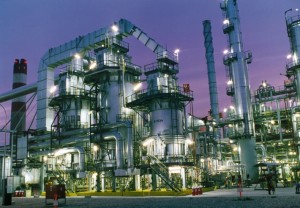
The global drop in the prices of petroleum products has been described as a big threat to the economy of the nation, but a threat that can be converted to the advantage of the nation.
Speaking at the 8th Oil Trading and Logistics Expo in Lagos last week, the speaker of the House of Representative, Alhaji Tambuwal, who was represented by the Honourable Dakuku Peterside, Chairman, House Committee on Petroleum (Downstream) said that the threat was real.

According to him “we acknowledge the fact the when there is a threat, there are also plenty of opportunities, and this threat is real. Globally, we acknowledge the fact that oil prices are dropping for a number of reasons.”
He further stated that the discovery of the Shale Gas Development across the world would have significant impact on the operations of the downstream operators in the Oil and Gas Industry.

Recall that global oil crude prices have since dropped since June by 25 percent and it seems not to have abated yet. As at 31st October, the Brent crude oil was at 82.24 dollars signaling a drop in price by 1.33 percent while WTI crude oil was 81.12 dollars representing a drop by 1.02 percent.
The Speaker also said that the emerging new shipping regime globally will affect the “logistics of our business” and added that “very soon, there will be a new legislative and regulatory regime guiding the operations of our industry and it will have a remarkable impact on the way we do business in the face of all these threats; players who are innovative will thrive.”
Speaking also at the event is the Minister of Petroleum, Mrs. Diezan Allision – Madueke who was represented by Mr. Oliver Okparajiaku, Deputy Director, Gas, Department of Petroleum Resources, while speaking on the clamour for more refineries to be built in the country so as to curtail the importation of refined petroleum products, divulged that Nigeria and other African countries would continue to depend on the importation of Petroleum Products for the next twenty years.
“Notwithstanding, the possibility of building new refineries in Africa, including new projects in Angola, Uganda, Mozambique and Nigeria among others, Africa will remain a net importer of Petroleum Products for at least 20 years to come,” she said.
She further emphasized the impact population growth has on the utilization of Petroleum Products when she said that “there are only 24 fuel refineries within the region with a total refining capacity of 1.6million barrels per day for a population that is close to a billion. Population growth means more energy consumption.”
So, she surmised that “the implication of population growth for Africa is that demand for Petroleum Products will continue to be on the rise without commensurate refining capacity addition”.
Meanwhile, Mrs. Winifred Akpani, the Director General and the Chief Executive Officer of the Northwest Petroleum and Gas Limited who also spoke at the event faulted the notion that discouraged the building of more refineries in Nigeria and Africa at large.
She said that the fact that refineries across the globe are shutting down did not mean that the country should not build refinery or encourage anyone that is building refinery to do so since there is a need for it.
She asked “will you because we have so many lawyers in Nigeria, ask why people are still going to Law school? We have about three refineries in Nigeria and some of them are at the point of closing down, so do we need refineries, yes I think we need” she concurred,” she added.
She further stated that more refineries will cut out the freight of exporting crude oil and importing refined products which will help grow the economy.
She maintained that Nigeria was not going to continue to depend on import unless there was a shortfall that might result in importing.
She added “that with the passage of the Petroleum Industrial Bill (PIB), there will be a transition period that will see more refineries being built in the country which on the long run will make the country self-sufficient”.
 MMS PLUS NG – Maritime, Aviation, Business, Oil and Gas News Online Newspaper with coverage in Maritime, Oil and Gas, Aviation, Power and Energy as well as Financial News
MMS PLUS NG – Maritime, Aviation, Business, Oil and Gas News Online Newspaper with coverage in Maritime, Oil and Gas, Aviation, Power and Energy as well as Financial News









